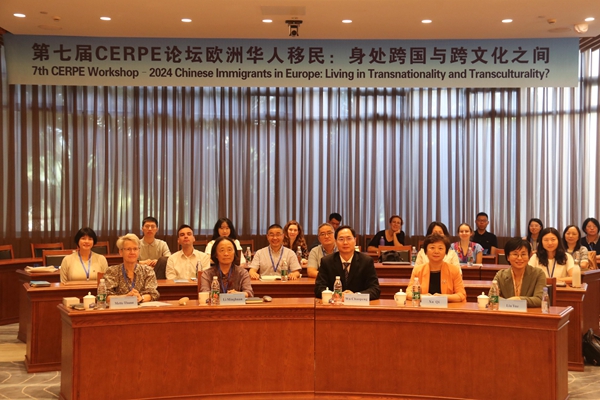7th CERPE Workshop on Chinese immigrants in Europe concludes in Xiamen University
The 7th CERPE (China-Europe Research Platform on Chinese Migration to and beyond Europe) Workshop, titled "Chinese Immigrants in Europe: Living in Transnationality and Transculturality?" was held at Xiamen University (XMU) from Nov 15 to 16, with over 40 scholars and experts from 11 countries participating.

Chinese and foreign experts and scholars gather at Xiamen University to discuss issues related to Chinese immigrants in Europe. [Photo/Xiamen University]
Professor Wu Chaopeng, vice president of XMU, reflected on the deep-rooted connections between Xiamen University and Overseas Chinese in his opening speech.
He expressed his hopes that the workshop will help build a collaborative research community on Sino-European immigration studies and contribute professional expertise and efforts to the exchange and mutual learning between Chinese and European civilizations.
The workshop included in-depth discussions on five topics: "Chinese migrants in Europe in the new era: new features", "the new generation of European Chinese community", "economic entrepreneurship and cultural exchanges between China and Europe", "Chinese ethnic associations and media in the new era", and "Qiaoxiang and the Chinese immigrants to Europe".
It addressed pressing issues such as the construction of a cultural identity for the new generation of Chinese immigrants, imaginaries of mobility, the internationalization of Chinese-language media, and trends in international mobility and digitalization.
Shen Wei, chair professor at Zhejiang University, delivered a keynote speech on the challenges that are currently confronting international academic exchanges.
Li Minghuan, professor of XMU and president of the International Society for the Studies of Chinese Overseas (ISSCO), chaired the closing ceremony and affirmed the effectiveness of the seminar.
CERPE was jointly initiated by Professor Li Minghuan and Mette Thun?, associate professor of Aarhus University in Denmark.
It adopts a rotating hosting mechanism between China and Europe and is dedicated to building a collaborative network of scholars in Sino-European immigration studies, with the goal of advancing research on Chinese diaspora in Europe. To date, seven sessions have been held.










